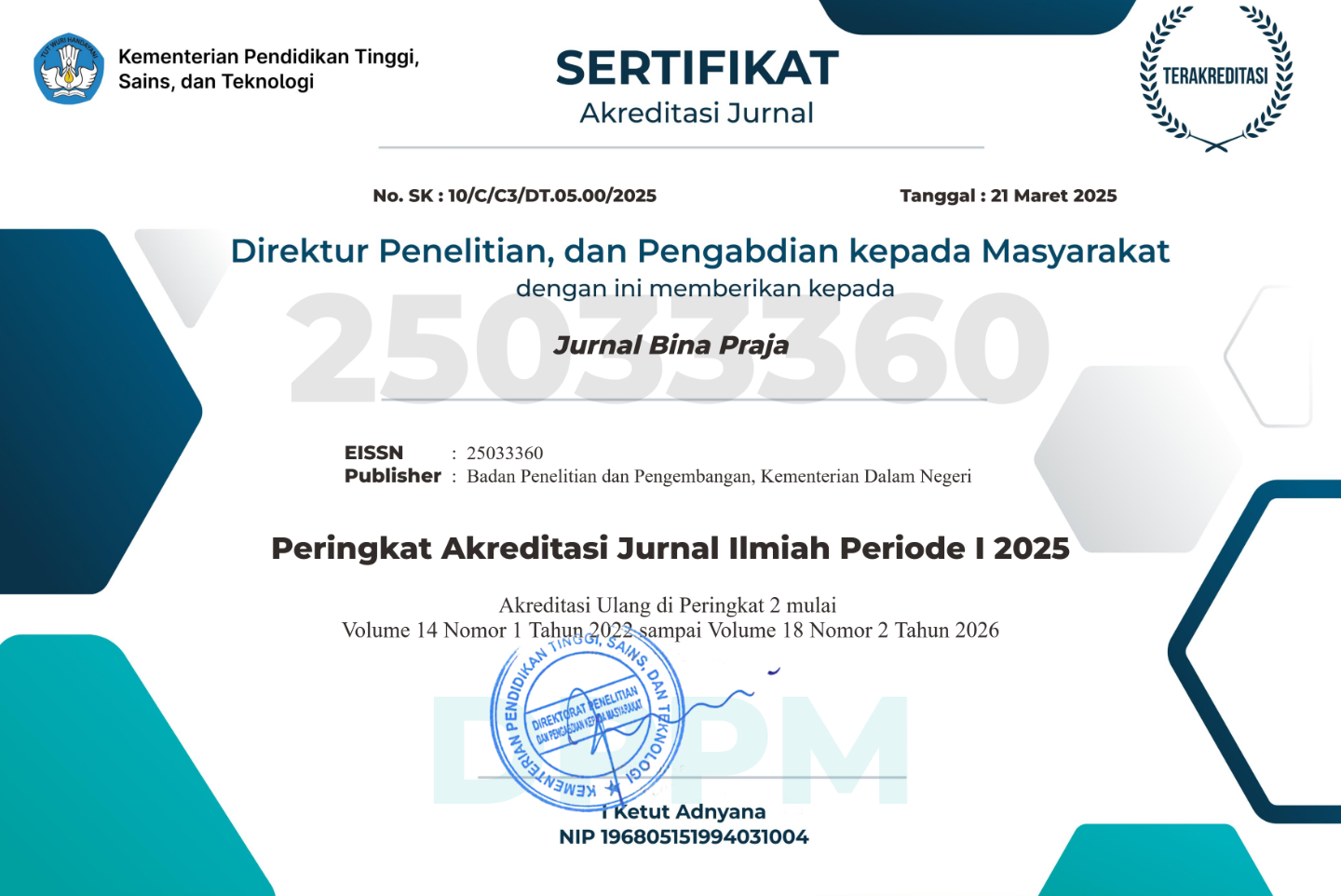Pembentukan Kelembagaan Keluarga Berencana di Kabupaten Sukabumi dan Kota Bitung
DOI:
https://doi.org/10.21787/jbp.07.2015.21-36Keywords:
Kata kunci, Ego Sektoral, BKKBD, APBD, dan RPJMD. Keywords, Sectoral Ego, Regional Budget Revenue and Expenditure, and Regional Medium-Term Development Plan.Abstract
Abstrak
Penelitian ini adalah tentang penyelenggaraan urusan keluarga berencana di daerah. Kendati begitu, penelitian ini berfokus pada pembentukan kelembagaan yang mengurus dan mengatur urusan KB di daerah. Tujuan penelitian ini adalah mendapatkan gambaran utuh peran lembaga KB yang sudah berdiri sendiri dalam mengimplementasikan urusan KB yang sudah diserahkan kepada pemerintah daerah. Dengan menggunakan metode deskriptif dan pendekatan kualitatif, penelitian ini menemukan beberapa hal. Pertama, ada kesan tarik menarik kepentingan (ego sektoral) di antara Kementerian Dalam Negeri dan Badan Kependudukan dan KB Nasional mengenai pembentukan lembaga BKKBD di provinsi, dan kabupaten/kota. Kedua, dua daerah, Kabupaten Sukabumi dan Kota Bitung yang telah membentuk BKKBD memiliki fokus perhatian dalam mendukung keberhasilan program KB. Keempat, integrasi program keluarga berencana ke dalam RPJMD, seperti yang dilakukan Pemerintah Kota Bitung dan Kabupaten Sukabumi, menjamin keberlangsungan program dan dianggarkan dalam APBD. Akhirnya, kajian ini menyimpulkan koordinasi dan sinkronisasi kebijakan KB mesti dilakukan oleh BKKBN dan Kementerian Dalam Negeri.
Â
Abstract
This study is about the implementation of family planning (KB) in regional affairs. Nevertheless, this study focuses on the establishment of institutional care and family planning in the area set up. The purpose of this study is to get a complete picture of the role of family planning agencies that had stood alone in implementing family planning matters that have been handed over to the local government. By using the methods of descriptive and qualitative approach, this study found several things. First, there is impression of conflicts of interest (sectoral ego) between Ministry of Home Affairs (MoHA) and National Population and Family Planning Board (BKKBN) on forming a population and family planning (BKKBD) institutions in province, county and city. Second, the two regions, Sukabumi County and Bitung City that have shaped BKKBD has focused attention in supporting the success of family planning programs. Third, the integration of family planning into the regional medium-term development plan, as did the City of Bitung and Sukabumi County, ensure the sustainability of the program and budgeted in the regional budget revenue and expenditure (APBD).Finally, this study concludes, coordination and synchronization policies on family planning should be done by the BKKBN and MoHA.
Downloads
References
Gifford and Elizabeth Pinchot. 1993. The End of Bureaucracy & the Rise of the Intelligent Organization. San Francisco, CA: Berret-Koehler Publishers, Inc.
Ijaiya G.T’; Raheem U. A. Olatinwo A. O; Ijaiya M.A and Ijaiya M.A. “Estimating the impact of birth control on fertility rate in Sub-Saharan Africaâ€.African Journal of Reproductive Health Vol 13 (4) December 2009.
Mitra, A. “National Population Policy in Relation to National Planning in Indiaâ€. Population and Development Review. Vol 3 (3) September 1977.
Molineaux, John W. And Paul J. Gertler. “The Impact of targeted Family Planning Program in Indonesiaâ€. Population and Development Review. Vol 26, Supplement: Population and Economic Change in East Asia (2000), pg 61-85.
Nwachukwu I.; Obasi O.O. “Use of Modern Birth Control Methods among Rural Communities in Imo State, Nigeriaâ€.African Journal of Reproductive Rights. Vol 12 (1) June 2008.
Osborne, David, dan Ted Gaebler. 1992. Reinventing Government: How the Entrepreneurial Spirit Is Transforming the Public Sector. New York: Plume.
Palumuleni, Martin E. “Socio-Economic and Demographic Factors Affecting Contraceptive Use in Malawiâ€. African Journal of Reproductive Health. Vol 17 (3) September 2013, pg 91-104.
Prasojo, Eko dkk. 2006. Desentralisasi dan Pemerintahan Daerah: Antara Model Demokrasi Lokal dan Efisiensi Struktural. Jakarta: Departemen Ilmu Administrasi UI.
Rasyid, Ryaas dkk. 2002. Otonomi Daerah dalam Negara Kesatuan. Yogyakarta: Pustaka Pelajar dan Pusat Pengkajian Etika Politik dan Pemerintahan.
Robinson, Warren C. And John A. Ross (eds). 2007. The Global Family Palanning Revolution: Three Decades of Population Policies and Programs. Washington DC: World Bank.
Schwartz J.l: Gabelnick H.L. “Current Contraceptives Researchâ€. Perspectives on Sexual and Reproductive Health. Vol. 34 (6) May 2002.
Shiffman, Jeremy. “Political Management in Indonesia Family Planning Programâ€. International Family Planning Perspectives. Vol 30 (1) March 2004.
Widjaja, HAW. 2005. Penyelenggaraan Otonomi di Indonesia. Jakarta: Raja Garfindo Persada.
Williamson L.M, ParkesA. Wight D. Petticre M; Hart G. “Limits to Modern Contraceptive Use among Young Women in Developing Countries: A Systematic Review of Qualitative Researchâ€. Reproductive Health. Vol 6 (3) July 2009.
Otonomi Daerah Gagalkan Program KB (Jurnal Nasional, 15/12/2011).
Program KB Gagal, Penduduk Indonesia 400 Juta Jiwa (Pos Kota, 12/2/2014).
Program KB Jalan di Tempat (Kompas, 12/6/2014).
Awas, Ledakan Penduduk (Manado Post, 15/7/2014)
















